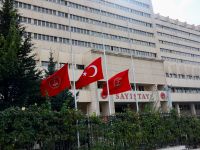Members of 56 Islamic states meeting in Doha have reiterated, once again, their intention of creating an Islamic common market. To further the process, Iran was assigned the task of researching the topic, disseminating news and information and make proposals in connection with the market’s formation.
Speaking to IRNA, the official Iranian news agency, Mohammad Nahavandian, Iran’s deputy commerce minister in charge of planning and information, explained that the goal of the common market would be to increase the prominence of Islamic countries as a trading force. Currently, he stated, the Islamic states’ share of world trade is only 3.3 percent, while their cumulative exports stand at $417 billion per annum.
Nahavandian did not provide many details about the plan of action toward establishing an Islamic common market, but a group of experts had investigated the matter when it gathered in Doha, a month before the recent Islamic conference The group concluded that the implementation of an existing plan of action for economic and commercial cooperation among the OIC member states provides the necessary basic framework for cooperation.
Also, the group stated that OIC framework agreement on a trade preferential system, which was signed in 1991 by the then-22 member countries, provides a basic framework for setting up a system of preferential trading. Consequently, the group urged those member states that have not yet signed or ratified the document, to do so as soon as possible.
Stressing the importance of an Islamic common market the expert group referred back to an earlier study conducted by the OIC, in which it was concluded that the establishment of the common market is imperative if the Islamic countries want to deal with powerful international economic blocks on an equal footing.
Furthermore, the group stated, members of the common market would benefit from scale of economies due to market enlargement; enjoy the advantages of the division of labor and the development of niche specializations and skills across the region; and be more effective in attracting foreign investment by presenting each member states as being part of a bloc with a dynamic market.
The expert group acknowledged that the establishment of an Islamic common market is a long-term process. To make it reality, there first has a determination of comparative advantages of the member states, a selection of priority sectors, the facilitation of market access, and a determination of competition policy free flow of goods in the region, and the creation of an Islamic free trade area.
Ultimately, it is believed that the common market will come to be as a result of a gradual integration of the various economies, in part through existing regional arrangements such as Arab League, ECO, GCC, D-8, AMU, CAEU and the creation of trade free zones, which will be used as building blocks.”
The idea for an Islamic common market was first raised at the Eighth Islamic Summit Conference of the Organization of Islamic Conference in Tehran, in December 1999. – (Albawaba-MEBG)








